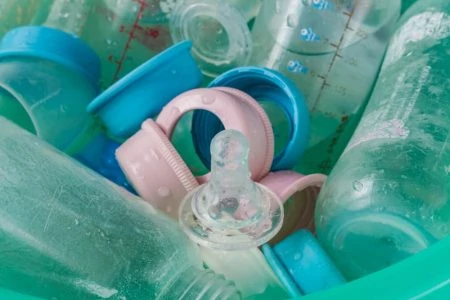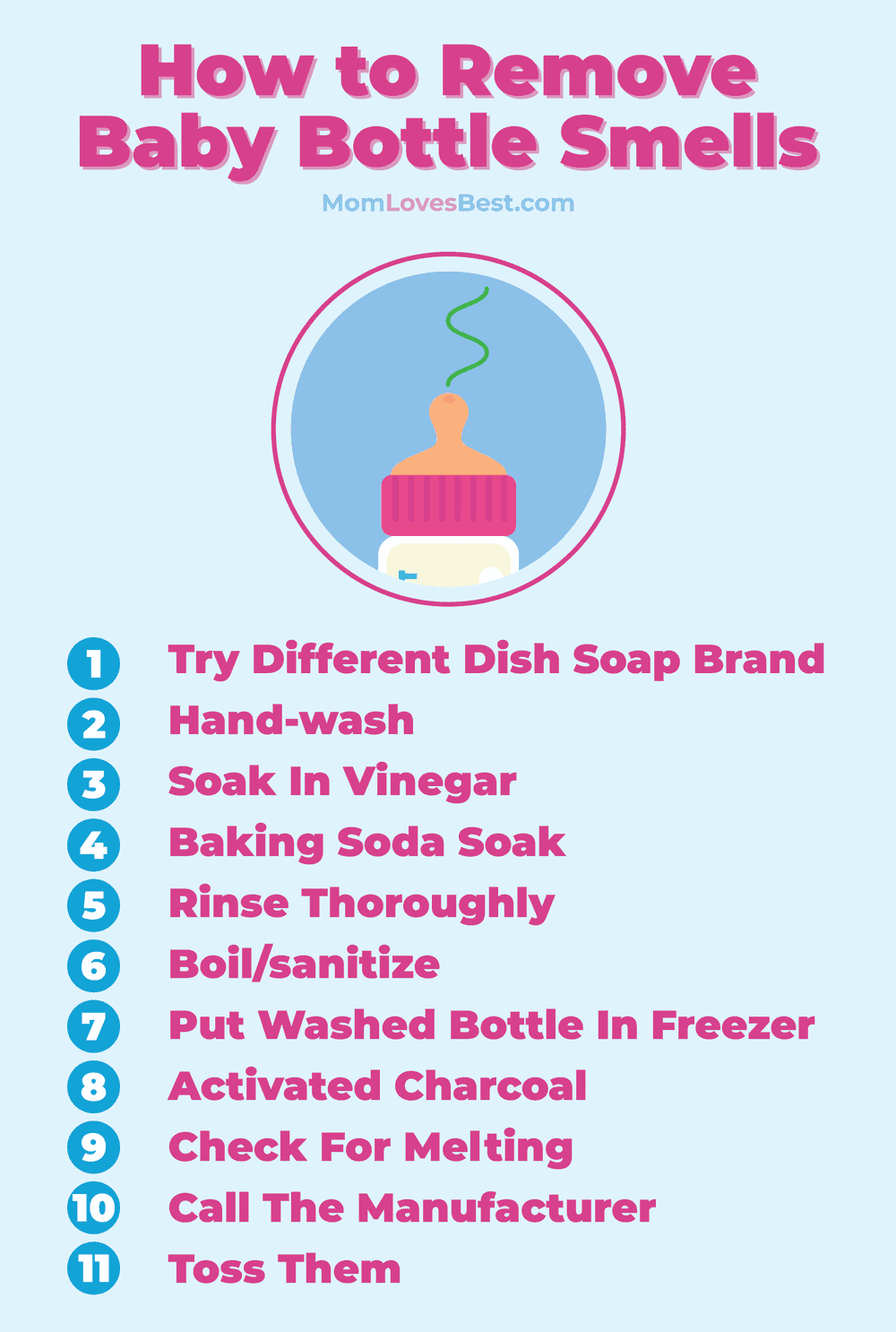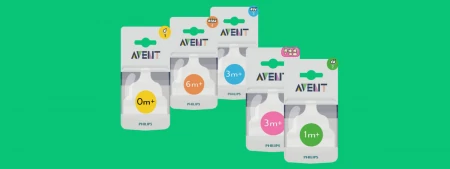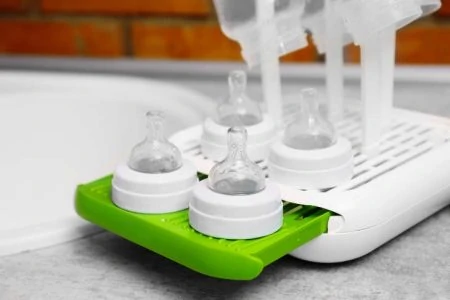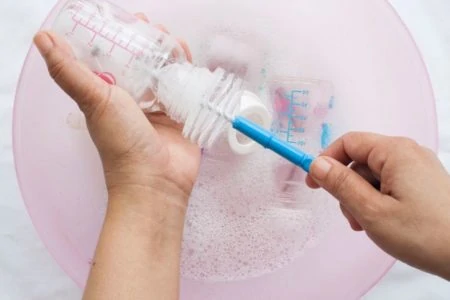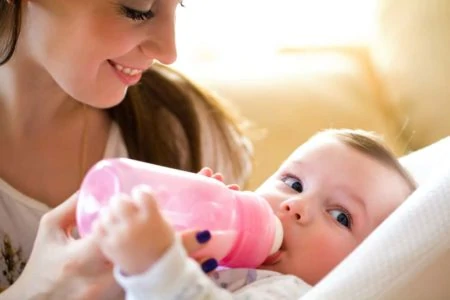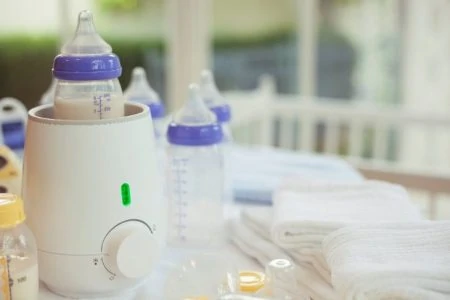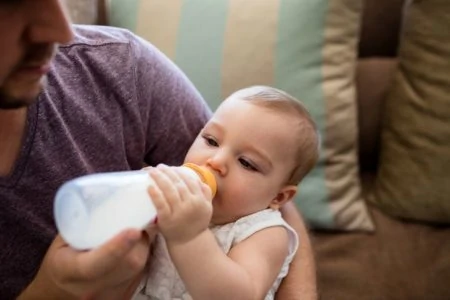If you have ever left a baby bottle in the car on a hot day, you know the smell. It is a nose-wrinkling mix of sour milk and regret. Even after washing, that funk likes to stick around.
Foul-smelling bottles are annoying, and they can make your baby refuse to eat.
We have dealt with our fair share of stinky bottles. We tested every cleaning hack to find out what actually works.
Below, we break down how to banish odors from soap, sour milk, burnt plastic, bleach, and formula. We will also help you prevent them from coming back so you do not have to throw away perfectly good gear.
Key Takeaways
- Rinse immediately: Always rinse bottles with cool water right after a feeding to stop bacteria from breeding.
- Use natural deodorizers: Baking soda and white vinegar are the most effective tools for stripping odors from plastic and silicone.
- Check your milk: A soapy smell might be excess lipase in breast milk, not the bottle itself.
- Know when to toss: If a bottle is burnt, melted, or has black mold spots that won’t scrub off, throw it away immediately.
How Can I Prevent Bottle Odors?
Baby bottles go through the wringer. Milk fats cling to the sides, and moisture creates a playground for bacteria. This is especially true for plastic and silicone, which are porous and absorb smells easily.
Here is how to keep them fresh.
- Rinse immediately: Do not let the bottle sit. Rinse it as soon as the baby is done. This prevents milk residue from turning sour or hardening in the corners.
- Disassemble completely: Take everything apart. Separate the nipple, ring, bottle, and valves. Milk loves to hide between the ring and the nipple base. Use a bottle brush to scrub every nook.
- Use the fridge: If you cannot wash a bottle right away, rinse it and put it in the refrigerator. The cold temperature slows down bacteria growth compared to leaving it in the sink.
- Follow manufacturer instructions: Check if your bottles are dishwasher safe. If they are, use the top rack. However, hand washing is often better for preventing odor absorption from other food dishes.
- Watch your storage: Follow guidelines for storing formula and breast milk. Discard fresh breast milk after four hours at room temperature. Formula goes bad after one hour at room temperature.
- Switch materials: Plastic holds onto smells. If you are tired of the stink, try glass bottles. They are non-porous and much easier to clean.
What To Do About Different Smells
1. Bottles Smell Like Soap
This is common with silicone bottles and nipples. Oil from the soap binds to the silicone, leaving a chemical taste and smell.
- Switch soaps: Ditch the scented dish soap. Use a fragrance-free, free-and-clear brand, or a soap made specifically for baby products.
- Hand-wash only: Dishwashers use harsh detergents and super-hot water that can degrade plastic and bake soap smells into the material.
- The vinegar rinse: After washing, rinse the bottles with hot water and a splash of white vinegar. The acid helps strip the soap residue.
- Boil it out: Boil the bottles for 5 to 10 minutes in plain water. This can help release the trapped soap oils from the silicone pores.
Is it the milk?
If you breastfeed, the soapy smell might actually be your milk. Some moms have high lipase activity. This enzyme breaks down fat in the milk, which can cause a soapy or metallic smell after it has been stored in the fridge or freezer.
If this is the case, the milk is safe to drink, but your baby might refuse it. To fix this in the future, you can scald fresh milk (heat it until tiny bubbles form around the edge) before freezing it to stop the lipase activity (1).
2. Bottles Smell Like Sour Milk
If you left a bottle in the diaper bag over the weekend, you know this smell. It is tough to remove, but baking soda usually does the trick.
- The baking soda shake: Wash the bottle first. Then, put two tablespoons of baking soda inside, fill it with hot water, and shake vigorously for two minutes. Let it sit for four hours (or overnight), then rinse.
- The vinegar bath: Vinegar cuts through fat and kills odors. Fill a clean basin with 50% hot water and 50% white vinegar. Soak the bottles and nipples for four hours or overnight. Wash them with soap and water afterward to remove the vinegar smell.
- Freeze the funk: After washing and drying the bottle, put the empty bottle in the freezer overnight. The cold helps neutralize the bacteria causing the odor.
- Check the milk source: Always smell your stored breast milk before pouring it. If the milk itself is sour, no amount of bottle cleaning will help.
3. Bottles Smell Like Burnt Plastic
This usually happens if a bottle falls onto the heating element in the dishwasher or you forget a boiling pot on the stove.
- Inspect for damage: Look closely. Is the plastic warped, melted, or deformed? If yes, throw it away. Melted plastic can release harmful chemicals. It is not safe to use.
- If it is just the smell: If the bottle looks perfect but picked up a burnt smell from the dishwasher air, try a vinegar soak (50/50 vinegar and warm water) overnight.
- The final test: After soaking and washing, sniff it. If it still smells like burnt chemicals, toss it. It is not worth the risk.
4. Bottles Smell Like Bleach
If you used a bleach solution to sanitize, the smell can linger.
- Cold water soak: Submerge the bottles in plain cold water for a few hours.
- Rinse and repeat: Rinse thoroughly under running water. Then, wash with hot, soapy water.
- Boil to finish: Boil the parts in plain water for 10 minutes to help evaporate the remaining chlorine residue.
5. Bottles Smell Like New Plastic
Fresh-out-of-the-box bottles often have a chemical manufacturing scent.
- Baking soda soak: Dissolve four tablespoons of baking soda in a quart of hot water. Soak the new bottles and parts overnight. Wash them normally the next morning.
- Sterilize: Run them through a steam sterilizer or boil them for five minutes before the first use.
- Contact support: If a strong chemical smell persists after cleaning, do not use the bottles. Contact the manufacturer for a replacement.
6. Bottles Smell Like Formula
Formula has a distinct, cheese-like smell when it goes bad. The proteins adhere stubbornly to plastic.
- Scrub with baking soda: Make a paste with baking soda and water. Use your bottle brush to scrub the paste into the interior walls of the bottle. Let it sit for 10 minutes before rinsing.
- Charcoal trick: This is for severe cases. Crush an activated charcoal briquette (ensure it is pure charcoal without lighter fluid) into powder. Pour it into the bottle, fill with hot water, seal, and leave for a few days. The charcoal absorbs organic odors. Wash thoroughly afterward.
- Replace the nipple: Often, the silicone nipple holds the smell worse than the bottle. If the bottle is fine but the nipple stinks, just replace the nipple.
